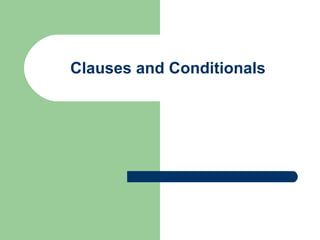Unit 4 (presentation conditinals)
•Télécharger en tant que PPT, PDF•
1 j'aime•328 vues
A EXCELENT WAY TO LEARN ABOUT"CONDITIONAL IF"
Signaler
Partager
Signaler
Partager

Recommandé
Contenu connexe
Tendances
Tendances (17)
Grammar - Condiitonals (zero, first, second, and third conditionals)

Grammar - Condiitonals (zero, first, second, and third conditionals)
Conditional Sentences Type 0, type 1 and type 2 + gap-fill exercises

Conditional Sentences Type 0, type 1 and type 2 + gap-fill exercises
En vedette
En vedette (20)
What’s the difference between an adjective clause and

What’s the difference between an adjective clause and
Similaire à Unit 4 (presentation conditinals)
Similaire à Unit 4 (presentation conditinals) (20)
Conditionals - Zero - First - Second and Third.pptx

Conditionals - Zero - First - Second and Third.pptx
conditionals-grammar-guides_134974 [Autosaved].pptx![conditionals-grammar-guides_134974 [Autosaved].pptx](data:image/gif;base64,R0lGODlhAQABAIAAAAAAAP///yH5BAEAAAAALAAAAAABAAEAAAIBRAA7)
![conditionals-grammar-guides_134974 [Autosaved].pptx](data:image/gif;base64,R0lGODlhAQABAIAAAAAAAP///yH5BAEAAAAALAAAAAABAAEAAAIBRAA7)
conditionals-grammar-guides_134974 [Autosaved].pptx
Dernier
Mehran University Newsletter is a Quarterly Publication from Public Relations OfficeMehran University Newsletter Vol-X, Issue-I, 2024

Mehran University Newsletter Vol-X, Issue-I, 2024Mehran University of Engineering & Technology, Jamshoro
Dernier (20)
UGC NET Paper 1 Mathematical Reasoning & Aptitude.pdf

UGC NET Paper 1 Mathematical Reasoning & Aptitude.pdf
Unit-IV; Professional Sales Representative (PSR).pptx

Unit-IV; Professional Sales Representative (PSR).pptx
Unit-V; Pricing (Pharma Marketing Management).pptx

Unit-V; Pricing (Pharma Marketing Management).pptx
General Principles of Intellectual Property: Concepts of Intellectual Proper...

General Principles of Intellectual Property: Concepts of Intellectual Proper...
Kodo Millet PPT made by Ghanshyam bairwa college of Agriculture kumher bhara...

Kodo Millet PPT made by Ghanshyam bairwa college of Agriculture kumher bhara...
Mixin Classes in Odoo 17 How to Extend Models Using Mixin Classes

Mixin Classes in Odoo 17 How to Extend Models Using Mixin Classes
This PowerPoint helps students to consider the concept of infinity.

This PowerPoint helps students to consider the concept of infinity.
ICT role in 21st century education and it's challenges.

ICT role in 21st century education and it's challenges.
Unit 4 (presentation conditinals)
- 2. What is a ‘conditional sentence’? A sentence discussing factual implications or hypothetical situations and their consequences. Full conditional sentences contain two clauses: the condition and the result. Eg.) If I go to the mall (condition), I will buy a pair of jeans (result).
- 3. Conditional Sentence The ‘result’ is the main clause and the ‘condition’ is a subordinate (dependant) clause. The properties of the conditional clause (tense, degree of probability) determine the properties of the entire sentence. Conditional clauses usually begin with “if” or “unless” – If you study, you will pass the exam. – You won’t pass the exam unless you study.
- 4. Three types of “IF” clauses in conditional sentences: Type 1: if + Simple Present, will-future – Expresses something that is likely to happen Type 2: if + Simple Past, would +infinitive – Expresses something that is not likely to happen Type 3: if + Past Perfect – Expresses something that is impossible.
- 5. Type 1: if + Simple Present, will-future Type 1 expresses something that is likely to happen. Eg. If I catch the bus, I will get to school on time. The main clause can also be at the beginning of the sentence: Eg. I will get to school on time if I catch the bus.
- 6. Type 1: if + Simple Present, will-future Conditional sentences Type 1 refer to the future. An action in the future will only happen if a certain condition is met. We don’t know for sure whether or not the condition will be fulfilled, but the condition is realistic and therefore likely to happen. It is likely that I will catch the bus and get to school on time.
- 7. Type 2: if + Simple Past, would + infinitive Type 2 expresses something that is unlikely to happen. Eg. If I had the time, I would go to the show. The main clause can also be at the beginning of the sentence: Eg. I would go to the show if I had the time. We usually use “were” instead of “was” in Type 2.
- 8. Type 2: if + Simple Past, would + infinitive An action could happen if the present situation were different. We don’t really expect the situation to change – we just imagine ‘what would happen if…’ It is unlikely that I will find the time to go to the show.
- 9. Type 3: if + Past Perfect Type 3 expresses something that is impossible. Eg. If I had finished my homework, I would have gone to the party. The main clause can also be at the beginning of the sentence: Eg. I would have gone to the party if I had finished my homework.
- 10. Type 3: if + Past Perfect Type 3 conditional sentences refer to situations in the past. An action could have happened in the past if a certain condition had been fulfilled. We just imagine what would have happened if the condition had been met. I wanted to go to the party but I wasn’t able to go to the party because I hadn’t finished my homework.
- 11. Type “0” The “0” conditional is formed with both clauses in the present tense. It is used to express a certainty, a universal statement, a law of science, etc. Eg. If you heat water to 100 degrees celsius, it boils. If you don’t eat for a long time, you become hungry. If the sea is stormy, the waves are high. The “0” conditional is different from true conditionals because the introductory ‘if’ can be replaced by ‘when’ or ‘whenever’.